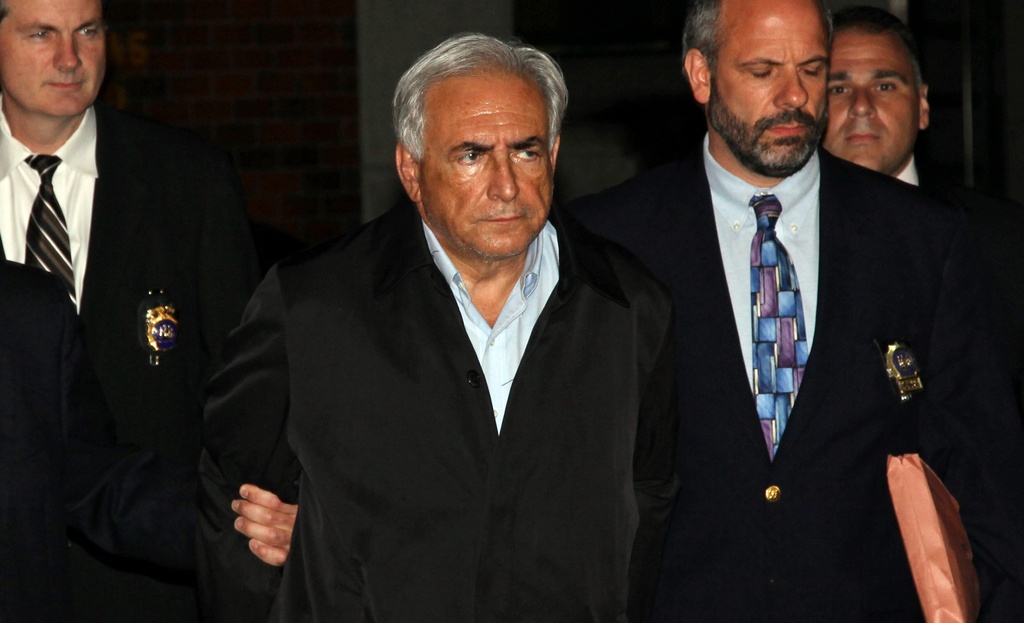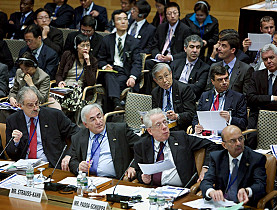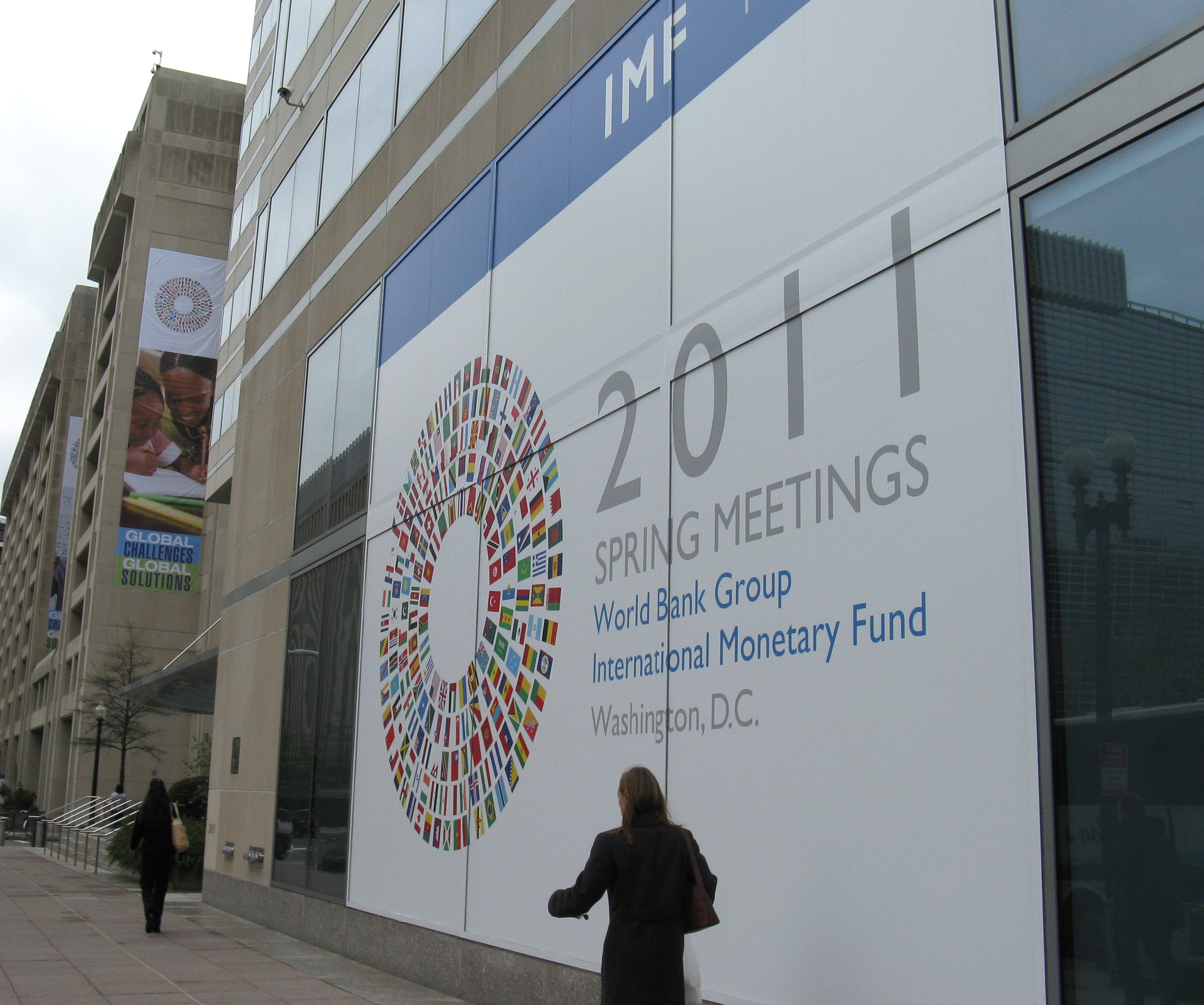Arrest seen as end of IMF head’s political career

Swiss newspapers say the charges of sexual assault against Dominique Strauss-Kahn, the head of the International Monetary Fund (IMF), will put an end to his political ambitions.
Strauss-Kahn, charged on Sunday with sexually assaulting a maid at a New York hotel, was considered to be a serious challenger to Nicolas Sarkozy in the 2012 French presidential elections.
“The fall of the heir apparent to the throne” was the headline in the story in the Bund and Tages-Anzeiger newspapers.
Describing the arrest of Strauss-Kahn just before his flight AF 23 took off from New York’s JFK airport bound for Paris, the two papers said his arrest in the first class section of the aircraft spelled the end of his political career in “spectacular and dramatic fashion”.
The French language dailies, Tribune de Genève and 24 Heures, agreed that the man leading opinion polls in France had been “dethroned”. But they asked who would benefit from the scandal, if Strauss-Kahn is found innocent and has been the victim of a trap.
The Tribune de Genève and 24 Heures said one of the principle beneficiaries would not be Sarkozy but François Hollande, another candidate to lead the Socialists into the presidential elections.
But, the Tribune de Genève and 24 Heures believe Marine Le Pen will once again be the big winner. “She will find even more people willing to listen to her argument that ‘all are corrupt, except me’.”
Fragile personality
Geneva’s Le Temps did not rule out the hypothesis that Strauss-Kahn may have been trapped. “Ethically, he is an individual with a reputation that makes such a stunt credible. And if he has fallen into a trap, if a man as smart as he is can be drawn to the precipice that reveals a fragile personality that is hardly compatible with the ambition to become president of France.”
“The silence in the boudoir” was the title of the commentary in the Aargauer Zeitung: “Many French politicians would prefer to lift the veil of silence from this extremely embarrassing affair. Strauss-Kahn has long benefited from this habit of looking the other way – a French mixture of Catholic double standards, political machismo and courtly secretiveness,” the paper wrote.
“But now the silence in the French boudoir could be the downfall of the IMF head. Since the actions of French politicians are not constantly scrutinised in the media these people lose a sense of their limitations, especially if they have difficulty keeping their sex drive in check. And Strauss-Kahn was forewarned. In 2008 just after arriving in Washington, he found himself caught up in a first affair with an IMF staff member.”
Grounded
The Aargauer Zeitung added that unlike the French, Americans don’t look the other way. “They even went as far as taking him out of the plane and grounding him, politically. There is one person who is naturally pleased by these events: Nicolas Sarkozy… suddenly the current president is again a good bet for re-election.”
The Italian-language Corriere del Ticino highlights the French passion for abbreviations. In Dominique Strauss-Kahn’s case, the IMF head has been reduced to three letters: DSK. “The denunciation by a 32-year-old hotel maid could reduce the well-known economist to little more than an acronym. In effect, the incredible news of his arrest in the United States could weigh very heavily on his political and professional future…even if up to now only the leader of France’s extreme rightwing, Marine Le Pen has dared to speak out: “He’s definitely been discredited as a candidate for the highest post in the country”.
The Neue Zürcher Zeitung (NZZ) was less sceptical about the potential damage to France’s Socialists. Strauss-Kahn was omnipresent in a typically French way: leading all polls in the media, appearing at international conferences as a stoic and competent crisis manager, considered by his opponents as a ‘caviar Socialist’, and in the Socialist Party as their great hope… He is certainly competent and charismatic and appeared as an economics expert predestined for a new role in a France afflicted by weak growth and [high] unemployment.”
However, the NZZ said that many saw Strauss-Kahn’s hesitancy to put his name forward as a presidential candidate as a sign that he really did not want to subject himself to the hard work expected of a true socialist election campaigner: “He is a chosen one but not a fighter. A Messiah who returns home, not one who must get involved in any mudslinging.”
Dominique Strauss-Kahn was born in Neuilly-sur-Seine, France, in 1949. He is married to French television presenter, Anne Sinclair, and has four children by a previous marriage.
He has degrees in law, business administration, political studies and statistics. His PhD in economics is from the University of Paris. He was an economics professor, corporate lawyer and legislator in France’s National Assembly. He served as finance minister from 1997-1999 and helped France prepare to abandon the franc for the euro.
Strauss-Kahn has been managing director of the International Monetary Fund (IMF) since November 2007 and won praise for helping push leaders to inject billions of dollars into the world economy during the global financial crisis. He introduced sweeping changes to ensure vulnerable countries swamped by the crisis had access to emergency loans, and others to give major emerging market countries such as China, India and Brazil greater voting powers in the IMF.
He sought the Socialist Party’s nomination for the 2007 presidential elections and is a possible candidate in next year’s presidential vote. He has been a visiting professor at Stanford University.
In 2008, Strauss-Kahn apologised for “an error of judgment” after an affair with a female IMF economist who was his subordinate. The IMF’s board of member countries warned him against further improper conduct, but cleared him of harassment and abuse of power and kept him in his job.
The International Monetary Fund was set up alongside the World Bank in 1945 as part of the so-called Bretton Woods institutions.
The IMF monitors the world economies, lends to members in economic difficulty and provides technical assistance to secure financial stability and reduce poverty.
The financial contributions of its 187 member countries are proportional to the importance of a country’s economy. This also defines their share of the votes.
Switzerland joined in 1992 following a nationwide vote.

In compliance with the JTI standards
More: SWI swissinfo.ch certified by the Journalism Trust Initiative















You can find an overview of ongoing debates with our journalists here . Please join us!
If you want to start a conversation about a topic raised in this article or want to report factual errors, email us at english@swissinfo.ch.